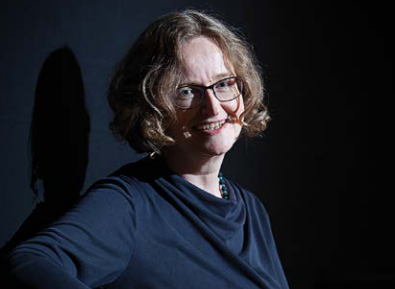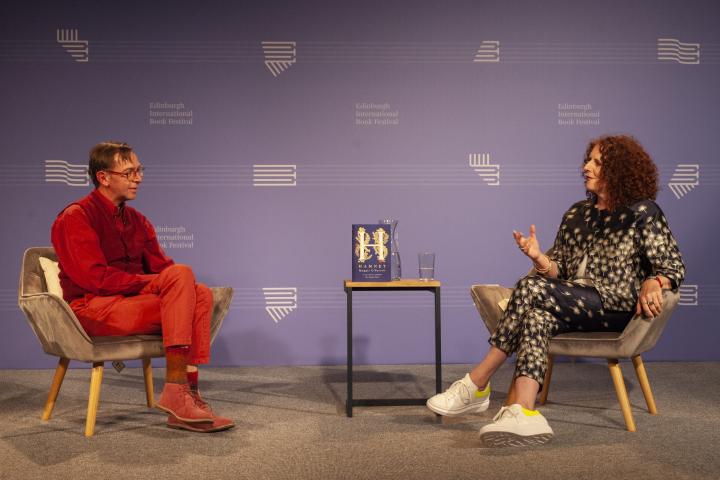Patricia Erskine's 2020 reflections
Despite the fact that festivals have been unable to go ahead this year in their usual form, the university has still been able to produce a fantastic amount of events. Patricia Erskine contributed to our collection of reflections illustrating some of the ways the University of Edinburgh has supported cultural life in the city this year.

- Please tell us about yourself and your role at The University of Edinburgh?
My role at the University is to manage our relationships with the College’s key strategic partners. I really enjoy bringing people together and fostering collaborations. A chemist friend once described me as a catalyst, which is very apt if you know your chemistry. My job is to make it easier for us to interact with our partners. A big part of my work is with the Edinburgh International Festival and the Edinburgh International Book Festival, working together on projects and events where we have shared interests and that demonstrate our shared values. There is a strong festival component to my work with the Edinburgh Futures Institute (EFI), including managing our partnership with the International Festival on You Are Here. This strand lets artists open up conversations around their work. The public get to meet with writers, directors, musicians, choreographers and performers, and the fresh perspectives that emerge will feed into our work in EFI.
- Had 2020 been a standard year, what work would you have traditionally been working on with regards to the city’s festivals?
Discussions about our festival collaborations normally get underway in the autumn. I look for opportunities to share the expertise of University staff and students across the emerging programmes. Examples from previous years include working with the Book Festival to bring Chimamanda Ngozi Adichie to Edinburgh in 2017. The author was so generous with her time. Her day began with receiving an Honorary Degree at St Cecilia’s Hall and ended with a busy book-signing after her interview with First Minister, Nicola Sturgeon. In between, she met our Mastercard Foundation scholars, who’d been studying “Dear Ijeawele, or a Feminist Manifesto in Fifteen Suggestions” in their reading group. It was amazing to bring them together at the Book Festival.
In 2018, for the Edinburgh International Festival’s opening event, “Five Telegrams”, our Performance Costume students worked with composer Anna Meredith and Richard Slaney of 59 Productions to create costumes that were inspired by communications from the Front in WW1.
I particularly enjoy working with colleagues from our Press Office and Festivals Office on how we tell our festival stories. There is so much going on in some of the collaborations, that simply communicating our messages is quite complex.
- How has that changed for you in the wake of the Covid-19 Pandemic?
This year began as normal and we had identified lots of opportunities across the festivals’ programmes. The announcements on 1 April 2020 that the summer festivals were not going to proceed was devastating. We were all acutely aware of the economic impact this would have for the creative and other sectors in Edinburgh, but of course we understood it was necessary to keep everyone safe. There really wasn’t an alternative, or was there?
For years, we have been collaborating with the festivals on digital innovation. Their support was key to the University and the City securing significant funding to help make Edinburgh the Data Capital of Europe. Many of those early collaborations happened behind the scenes with MOOCs or capturing data from performers. This year presented an opportunity to test audience engagement with online cultural events on a scale we’d not seen before. So in fact, many of our partnerships continued, but in new ways as the festivals developed online offerings.
The International Festival’s “My Light Shines On”, was a spectacular celebration of artists and audiences, where production teams worked out how to operate safely in venues to deliver an inspiring programme. We are also continuing our You Are Here partnership, by supporting the creation of a podcast series based on the Morning Manifesto strand from last year. This will allow our students and others to consider how the manifesto themes still resonate now, one unprecedented year on.
The Book Festival’s online programme was a fantastic achievement with 146 events which by mid-September had already been viewed over 210,000 times. I was privileged to visit their studio in the Assembly Rooms on the last day of the festival, just before our sponsored event with Arundhati Roy. It was an impressive set-up, a highly technical and professional operation which enabled the focus to stay on the writers and the audiences.

Maggie O'Farrell in conversation with Stuart Kelly at the 2020 Edinburgh International Book Festival online
c Robin Mair, Edinburgh International Book Festival
- What have been your observations of working during lockdown?
Working at home with my family around all day is very different to working in the office. And yet, I am still the (home) office teaspoon fairy – the one who washes all the used teaspoons left around the kitchen sink and occasionally declares a teaspoon amnesty. Just bring back all the teaspoons from around the house, and there’ll be no questions asked.
On a more serious note, I was unprepared for how much longer everything takes in lockdown. The Festivals have been wise to develop online offerings that extend into the autumn. Wonderfully, that means our students will have more opportunities to engage with festival content this year. It will provide much needed cultural nourishment, essential for our well-being.
I really miss informal interactions at work. I miss asking someone after a meeting “What way are you going?” Then walking together for a while, catching up on what’s going on with them and often incidentally getting to the heart of a problem we can then resolve together. That’s much more difficult to do online.
I’ve also really missed not being able to offer an internship opportunity to our students this summer. Over the previous four summers, Alice, Jenny, David and Libby were a joy to work with and made huge contributions to our festival projects, gaining valuable experience along the way.
- Have the projects you have been working on surprised you in any way?
At the Edinburgh Futures Institute, we embarked on some COVID-19 related projects over the summer. In one of these, we asked some of our cultural and community partners about their experiences of the pandemic. It has been inspiring to hear the responses. People shared their personal experiences of the illness and its long-lasting effects, of the impact of lockdown on creative and community work and of the urgent focus on Black Lives Matter. It is a listening project we hope to continue in the coming months and I’m delighted that students on the first EFI undergraduate course will be able to listen and respond to the stories. Over the summer, EFI also supported the Edinburgh Culture Conversations, which provided a great platform for sharing how culture can support our recovery from the pandemic. It was both surprising and uplifting to hear the panellists’ hopeful stories and experiences.
- What else have you learnt from this situation?
The Book Festival has offered me hope that warm audience engagement is possible using online platforms. I love how their audiences used the online chat facility to replicate the camaraderie you get in person in their book shop, cafés and queues. Their simple direction to “Say something nice…” seemed instantly to produce warm, supportive and friendly audience communities online. The Festivals and the University have learned a huge amount this year about producing online cultural content and creating really engaging public events online. I’m sure we will continue to learn from each other, and that our students, our communities and our public audiences will all benefit.

